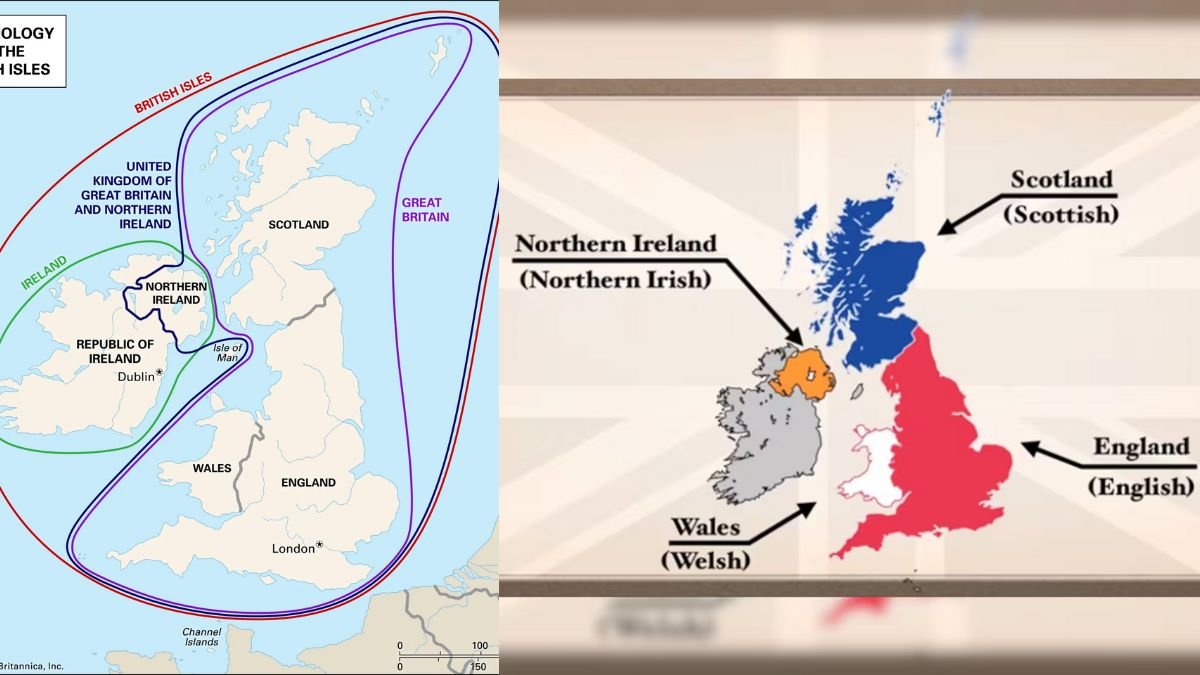The terms Great Britain and the United Kingdom are often used interchangeably, but they are not synonymous. The reason behind these two names and their differences can be traced back to the extensive history of the British Isles.

Great Britain: Island and Political Term
Great Britain refers to both a geographical and political entity. Geographically, it denotes the largest island within the British Isles, which includes Britain and Ireland (with smaller islands like the Isle of Wight). In the Middle Ages, the name “Britain” was also used for a portion of France known as Brittany. Consequently, the term Great Britain emerged to specifically refer to the island. However, it gained official significance in 1707 when England and Scotland, previously rival kingdoms, were united as the Kingdom of Great Britain.
United Kingdom: Political Term
The history of Ireland is intricately connected to the development of the United Kingdom. Since the 12th century, Ireland had effectively been an English colony. When Great Britain came into existence, Ireland remained under the influence of the British crown. In 1801, it formally joined Great Britain, resulting in the creation of a single political entity known as the United Kingdom of Great Britain and Ireland. However, this union lasted until 1922 when Ireland seceded, except for six counties in the north. The seceded portion of Ireland eventually became a sovereign republic, while the remaining partner adopted the official name of the United Kingdom of Great Britain and Northern Ireland.
Distinct Meanings
Great Britain, therefore, holds both a geographic and political connotation. Geographically, it refers to the island known as Britain. Politically, it encompasses England, Scotland, and Wales, along with the outlying islands they administer, such as the Isle of Wight.
On the other hand, the United Kingdom is purely a political term. It represents an independent country that encompasses the entirety of Great Britain and the region now referred to as Northern Ireland.
Understanding the Distinction: United Kingdom, Great Britain, and England
On June 24, the news of the United Kingdom’s decision to exit the European Union, known as ‘Brexit,’ spread rapidly around the globe. However, confusion arose regarding who exactly was leaving the EU. Many countries’ general audiences were puzzled by the terms United Kingdom, Great Britain, and England, often used interchangeably despite their distinct differences. It is crucial to clarify these differences: the United Kingdom is a country, Great Britain is an island, and England is a part of that island.
The United Kingdom
The United Kingdom is an independent country situated on the northwest coast of Europe. It comprises the islands of Great Britain and Northern Ireland. Its official name is the ‘United Kingdom of Great Britain and Northern Ireland.’ London serves as its capital, and Queen Elizabeth II currently holds the position of Head of State. The United Kingdom is one of the founding members of the United Nations and holds a seat on the United Nations Security Council. In 1801, the Kingdom of Great Britain and the Kingdom of Ireland were unified, leading to the formation of the United Kingdom. However, during the 1920s, Southern Ireland became independent, resulting in the modern-day name ‘United Kingdom of Great Britain and Northern Ireland.’
Great Britain
Great Britain refers to the island situated off the northwestern coast of France and Eastern Ireland. The majority of the United Kingdom consists of the island of Great Britain. It encompasses three relatively autonomous regions: England, Wales, and Scotland. Great Britain is the ninth-largest island globally, covering an area of 209,331 square kilometers. England is located in the southeastern part of Great Britain, while Wales lies to the southwest and Scotland to the north. Although Scotland and Wales are not independent nations, they possess varying degrees of autonomy in terms of internal governance.
England
England is located in the southern region of the island of Great Britain and is a constituent country within the United Kingdom. The United Kingdom comprises England, Wales, Scotland, and Northern Ireland as administrative regions. While each of these regions possesses different levels of autonomy, they are all part of the United Kingdom. England is often mistakenly used to refer to the entire country, but this is incorrect. Although London is frequently associated with England, using the term England to represent the entire country gives the impression of an independent nation, which is inaccurate.
Ireland
Lastly, let us consider Ireland. The northern portion of the island of Ireland, known as Northern Ireland, is an administrative region of the United Kingdom. The remainder of the island, called the Republic of Ireland, is an independent country.
Utilizing the Correct Terminology
It is crucial to use the correct terms when referring to these regions. Incorrectly labeling the United Kingdom as Great Britain or England can lead to confusion. The three terms hold distinct meanings: the United Kingdom is a country, Great Britain is an island, and England is one of the four administrative regions within the United Kingdom.
Conclusion
In summary, while Great Britain and the United Kingdom are often used interchangeably, they have different meanings. Great Britain refers to the island itself, as well as the political entity comprising England, Scotland, and Wales. The United Kingdom is a political term encompassing all of Great Britain and the region now known as Northern Ireland. Understanding these distinctions provides clarity when discussing the geographical and political aspects of the British Isles.